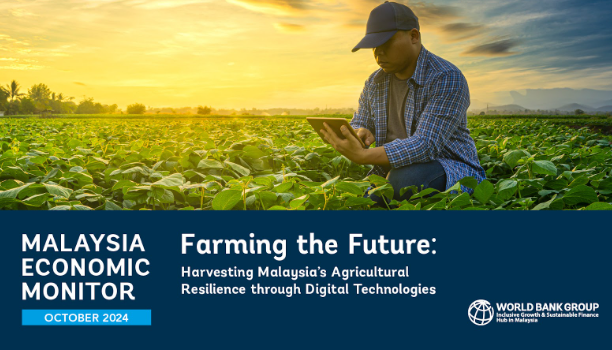The Malaysia Economic Monitor report suggests the sector presents a key opportunity for Malaysia’s SMEs to drive innovation.
Kuala Lumpur, October 14, 2024 – Malaysia’s Small and Medium Enterprises (SMEs) are poised to play a transformative role in the nation’s agricultural sector as the adoption of digital agriculture technologies (DATs) accelerates, according to the World Bank’s latest Malaysia Economic Monitor report. The report, titled “Farming the Future: Harvesting Malaysia’s Agricultural Resilience through Digital Technologies,” emphasises that DATs can significantly enhance productivity, sustainability, and competitiveness—especially for smallholder farmers.
Agriculture: A Growth Opportunity for SMEs
With agriculture contributing 7.2% growth in Q2 2024, the sector presents a key opportunity for Malaysia’s SMEs to drive innovation. Technologies like GPS, drones, sensors, and data platforms are expected to enhance precision agriculture and streamline supply chains. This will directly impact SMEs engaged in agribusiness, agrofood processing, and rural digital marketplaces, creating new avenues for market entry and growth.
“Smallholders and SMEs have the most to gain from integrating these technologies. Digital platforms and marketplaces will not only improve productivity but also enhance marketing and export competitiveness,” said Rafizi Ramli, Malaysia’s Minister of Economy.
The World Bank highlights that Malaysia’s agriculture sector has struggled with low adoption rates of advanced technologies. However, DATs offer solutions that can address this challenge. Platforms facilitating e-commerce for agricultural products will allow rural SMEs to access broader markets while fostering fair competition.
Investing in an innovation ecosystem is crucial to achieving this transformation. Supportive government policies and R&D initiatives targeting SMEs are expected to spark technological innovations. This shift is likely to create resilient agrofood value chains, enhance food security, and boost export capabilities for small businesses.
Actionable Strategies to Support SMEs
The report outlines three key priorities to ensure rural businesses, including SMEs, benefit from the digital transition:
1. Financing Public Goods: Allocate resources to implement DAT infrastructure for rural areas.
2. Investment in Innovation Ecosystems: Promote an environment where SMEs can leverage DAT-driven innovations.
3. Data Governance & Incentives: Create policies for data privacy and offer incentives for SMEs adopting digital solutions.
Zafer Mustafaoğlu, World Bank Country Director for the Philippines, Malaysia, and Brunei, added: “Malaysia’s agricultural transformation, supported by DATs, can position SMEs at the forefront of economic growth. It will reduce operational costs, ensure fair access to information, and build long-term resilience within the food system.”
Impact on SMEs and the Broader Economy
With Malaysia’s GDP expected to grow by 4.9% in 2024, compared to 3.7% in 2023, the agricultural sector’s revival—driven by DATs—plays a crucial role in achieving these targets. The report suggests that well-equipped SMEs, working within a digitally transformed agriculture ecosystem, can fuel sustainable growth for the sector and beyond.
The government’s efforts to modernise agriculture align with broader objectives, including greater productivity, increased R&D, and market competitiveness. SMEs are expected to play a vital role in driving innovation across the agrofood sector, ensuring Malaysia stays on track toward high-income nation status.
By embracing digital agriculture technologies, Malaysia’s SMEs are set to become the linchpin of a more sustainable, innovative, and resilient agricultural economy.








